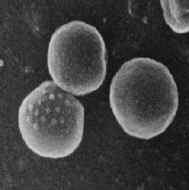
Microbial Diseases A to Z | Disease Home Page | Bio 406 Home Page | MicroWorld |

Psittacosis (Parrot fever) is a rare zoonotic disease in humans, occurring more commonly in birds. It is caused by Chlamydophila psittaci, a close relative of Chlamydia. C. psittaci also are obligate intracellular parasites. Transmission is airborne, and the infection proceeds from the lungs to other organs. Necrosis due to cell death and inflammation are the causes of symptoms. Edema in alveoli and mucus plugs in bronchioles lead to anoxia.
Chlamydia and Chlamydophila are tiny (~0.4 um) Gram-negative bacteria without peptidoglycan. They spread via the infectious extracellular elementary body (EB - photo). Intracellularly, they grow and replicate in the reticulate body (RB) form.